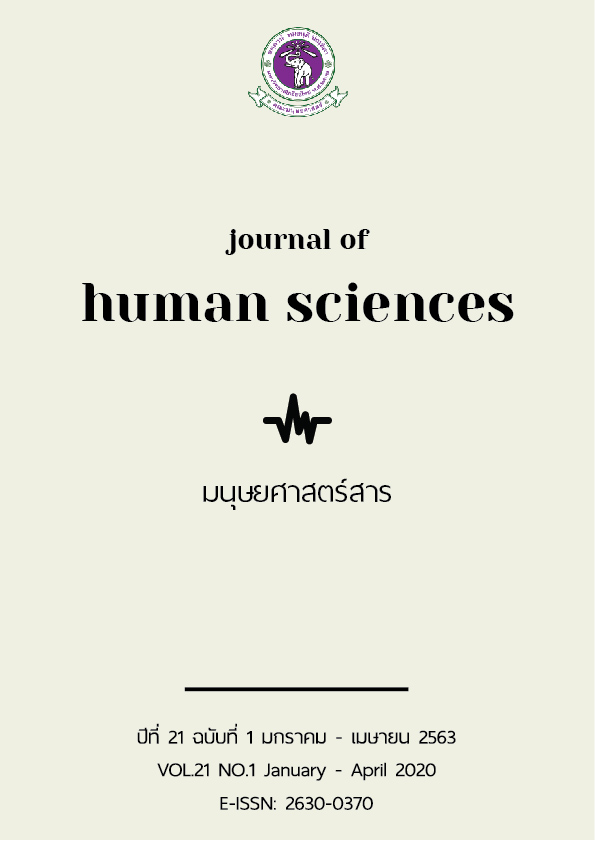คติด้านความกตัญญู (孝) ในวัฒนธรรมจีน ภาพสะท้อนจริยศาสตร์ครอบครัวจีนผ่านสำนวน
Main Article Content
บทคัดย่อ
สำนวนเป็นปรากฏการณ์ทางภาษาที่พบได้ในทุกภาษาและเป็นสิ่งสะท้อนให้เห็นถึงวิธีคิดหรือทัศนคติบางประการต่อโลกของชนชาติใดชนชาติหนึ่ง อีกทั้งยังฉายภาพให้เห็นถึงวัฒนธรรมผ่านภาษาได้เป็นอย่างดี เนื่องจากสำนวนปราฏขึ้นมาได้โดยผ่านการกลั่นกรองจากวิถีชีวิต ประสบการณ์และการมองโลกในช่วงระยะเวลาหนึ่งจนเกิดเป็นชุดคำศัพท์ขึ้นมาใช้ในภาษาหนึ่งๆ อย่างยาวนาน บทความนี้มุ่งอภิปรายหลักความกตัญญู (孝—Filial Piety) อันเป็นหลักจริยศาสตร์ครอบครัวที่กำหนดคุณค่า การจัดระเบียบทางสังคมและพฤติกรรมที่กำหนดความมีคุณธรรมประการหนึ่งตามคติของชาวจีนที่สะท้อนผ่านสำนวนจีน จากการศึกษาพบว่า ความกตัญญูเป็นหลักคุณธรรมประการหนึ่งที่ขงจื่อให้ความสำคัญ เพราะเป็นหลักที่ขงจื่อเห็นว่าเป็นต้นกำเนิดความมีคุณธรรมของมนุษย์ อีกทั้งยังช่วยสร้างความเป็นชุมชนมีมนุษยธรรมจากหน่วยย่อยของสังคม นับตั้งแต่มีการยกย่องให้ปรัชญาสำนักขงจื่อเป็นแนวคิดหลัก ในการดำเนินการปกครองตั้งแต่สมัยราชวงศ์ฮั่น แนวคิดเรื่องความกตัญญูของขงจื่อได้เข้ามามีบทบาทกำกับการจัดระเบียบทางสังคมในระดับครอบครัว เพื่อผลลัพธ์ในการสร้างเสถียรภาพให้แก่รัฐ จึงทำให้คุณธรรมอันเป็นเพียงหลักปฏิบัติของบุตรต่อบิดามารดา กลายมาเป็นคุณธรรมหลักที่สังคมยึดถือเป็นบรรทัดฐานอันเป็นส่วนหนึ่งที่กำหนดอัตลักษณ์ของสังคมวัฒนธรรมจีนตั้งแต่อดีตมาจนถึงปัจจุบัน
Article Details
เอกสารอ้างอิง
Chanthsithiporn, S. (2018). Lak kwamsamphan ha prakarn lae lak banthadtharn sam mummong khong lak chariyatham kub karn raksa sathierapharp khong sangkhom jin
[The five relationships, the three mainstays, viewpoints from ethics and the stability of Chinese society]. Journal of MCU Social Science Review, 7(2). 247-261.
Chen, X.W. (2006). Lunyu zhong de fuzi guanxi yu shijie renquan xuanyan de hunyin zizhuquan zhi tantao [The analysis of parent-child relationship in the Analects and the Human Rights Declaration’s marriage autonomy]. Yingyong lunli yanjiu tongxun, 39. 60-67.
Diyifanwen 第一范文. (2019, July 15). Dizigui [The Students ‘Rules]. Retrieved from https://www.diyifanwen.com/tool/dizigui/
Gayane, V. Y. (2011). Proverbs and Sayings from the Perspective of Cultural Identity, in Higher Linguistic Education from the Perspective of Reforms: New Approaches, Prospects, and Challenges. Bucharest: UNESCO.
Gushiwenwang 古诗文网. (2019, July 15). Mengzi [Mencius]. Retrieved from https://so.gushiwen.org/ guwen/bookv_1245.aspx
Han Dian 汉典. (2019, July 18). Sen Shang [Sen Shang]. Retrieved from https://www.zdic.net/hans/参商
Hwang, K. K. (1999). Filial piety and loyalty: Two types of social identification in Confucianism. Asian Journal of Social Psychology, 2. 163-183.
Jin, S. L. (2005). Rujia lunli dui Zhongguo chuantong zuzhi de yingxiang [Confucian Ethics and the impact to the Chinese social Organization]. Gansu shehui kexue, 3. 175-177.
Kabinsing, C. (1989). Kongzi: Khamsorn thang phradya-sadsana [Confucianism: The Philosophical and religious teaching]. Journal of East Asian studies, 5-12.
Kwan, K.-L. K. (2000). Counseling Chinese People: Perspective of Filial Piety. Asian Journal of Counseling, 7(1), 23-41.
Li, L. X. (2012). Rujia zhi xiao yu Nuxingzhuyi guanhuai lilun [Confucianism’s Filial Piety and Feminism Theory]. Jinan: Shandong renmin chubanshe.
Li, R. Q. (2008). Zhongguo chuantong jiating xingtai ji jiating jiaoyu---yi Sui-Tang Wudai jiaoyu wei zhongxin [Traditional Chinese family patterns and family education: The study of Sui-Tang and Five Dynasties Periods]. Beijing: Renmin chibanshe.
Li, T. T. (2008). Xiao wenhua ciyu yu han minzu wenhua tezheng [Filial piety Lexicons and characteristics of Chinese culture]. (Thesis for Master of Arts). Inner Mongolia University, China.
Liu, G. N. (2003). Zhongguo shehui de fuquan jiating yu quanwei renge [China's Patriarchal Family and the Personality-Formation of Authority]. Hangzhou shifan daxue xuebao (ziran kexue ban), 2. 1-4.
Liu, S. X. (2013). Hanyu miaoxie cihuixue Chinese lexicology]. Beijing: Shangwu yinshuguan.
Methanont, A. (2008). Godmai kub karn patirub sathaban khrobkhrua nai Vietnam samai Ratchawong Le (koso 1428-1788) [Law and Family Reform in the Le Dynasty Vietnam (1428-1788)]. Journal of Mekong Societies, 4(2). 13-44.
Nichols, R. (2013). The Origins and Effects of Filial Piety: How Culture Solves an Evolutionary Problem for Parents. Journal of Cognition and Culture, 13. 201-230
Qian, D. Q. (2007). Tang lu shuyi xinzhu [The New annotation of Tang Dynasty Code]. Nanjing: Nanjing shifan daxue chebanshe
Schrecker, J. (1997). Filial Piety as a Basis for Human Right in Confucius and Mencius. Journal of Chinese Philosophy, 24, 401-412.
Sun, X. (1988). Handai “Xiao” wenhua gainian de bianhua [The changing of filial culture in Han Dynasty period]. Kongzi yanjiu, 3, 93-100.
Yang, S. H. (2006). Jiating shehui xue [Sociology of family]. Beijing: Gaodeng jiaoyu chubanshe.
Yang, S. J. (2017). The Reconciliation of Filial Piety and Political Authority in Early China. Dao, 16. 187-203.
Sun, W.Z. (1989). Hanyu shuyu xue [The Study of Chinese idiomatic phrases]. Chang Chun: Jilin jiaoyu chubanshe.
Sun, X. (1988). Handai “xiao” de guannian de bianhua [The changing of filial piety concept in Han Dynasty]. Kongzi yanjiu, 3. 93-100.
Suowen Jiezi 说文解字. (2019, July 15). Xiao [Filial piety]. Retrieved from
http://www.shuowen.org/view/5360
Tan, A. K.-h. (2004). Filial Piety in Chinese Thought and History. New York: RoutledgeCurzon.
Tu, L. C., & Li, A. L. (2015). Kongzi zhi “Li” de zhengzhi zhexue yunhan[Confucius’s rule of propriateness and political philosophy connotation]. Jiangsu shehui kexue , 5. 12-17.
Yang, B. J. (2007). Lunyu yizhu [The annotative analects of Confucius]. Beijing: Zhonghua shuju.
Yu, L. (2015). “Xiao zhi tianxia” yu “fa zhi tianxia” --- xin shidai de xiao wenhua jianshe chutan [Ruling the world with filial piety and ruling the world with law: the analysis of the filial culture. construction in new era]. International journal of Chinese & Comparative Philosophy of Medicine, 13(1). 27-41.
Wang, C. K. (2007). Xianqin rujia xiaodao yanjiu [The research on Confucianism in pre-Qin preriod]. Chengdu: Bashu shushe.
Wang, J. (2001). Xiaoti: yi zhong dui rujia jingshen de youxiao quanshi—jianlun “cheng” [Filial piety: The effective explanation for the spirit of Confucianism]. Jiangsu shehui kexue, 2. 23-29.
Wu, Z. K. (2000). Zhonghua yan yao yanjiu [The study of Chinese proverbs and ballads]. Baoding: Hebei daxue chubanshe.
Xiao, B. (2012). Zhongguo xiao wenhua gailun [Introduction to Chinese filial culture]. Beijing: Renmin chubanshe.
Xie, J. X. (2011). Xiao de jinshen yu Zhongguo wenhua [The spirit of filial piety and Chinese culture]. Yi guandao yanjiu, 1. 145-173.


